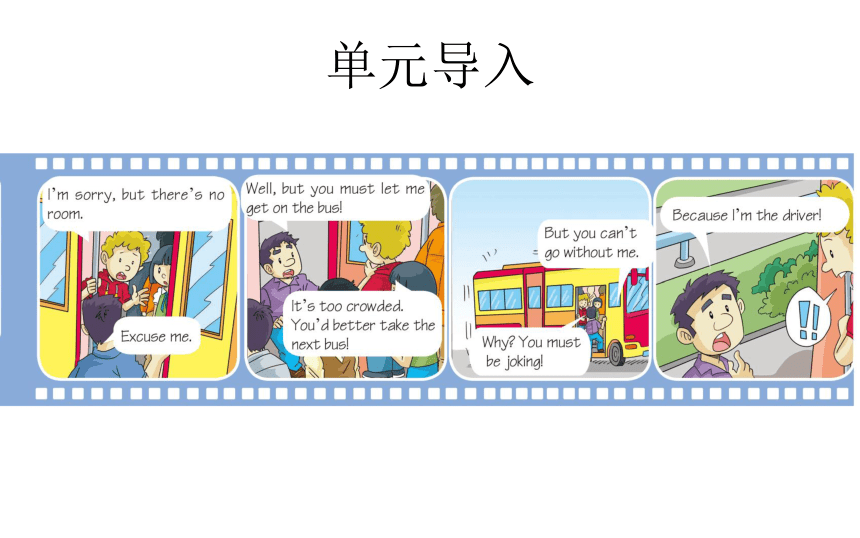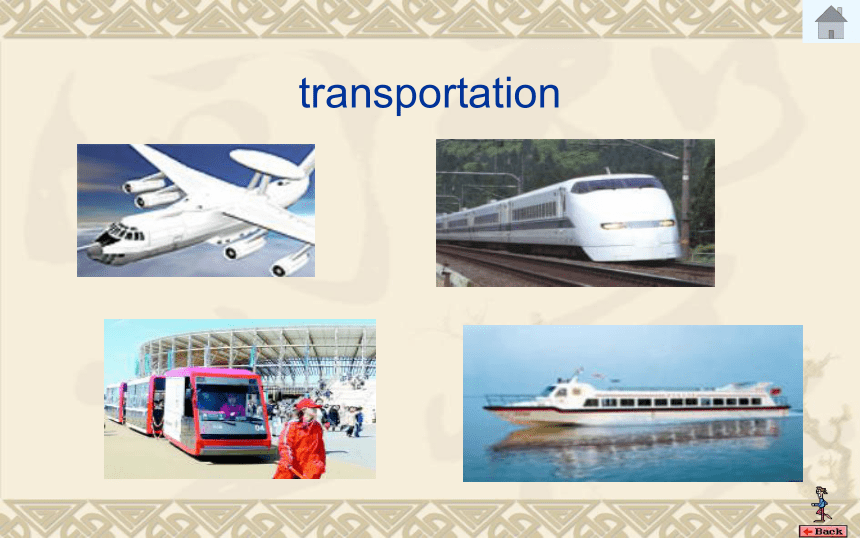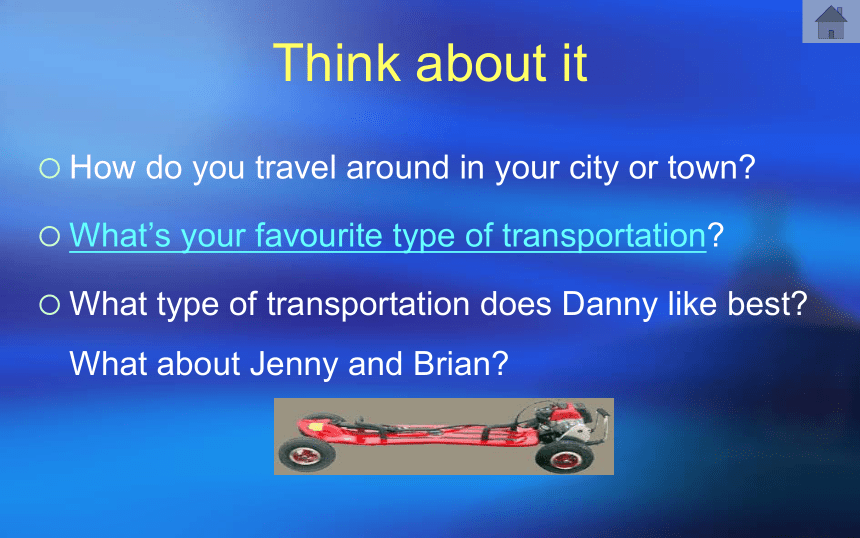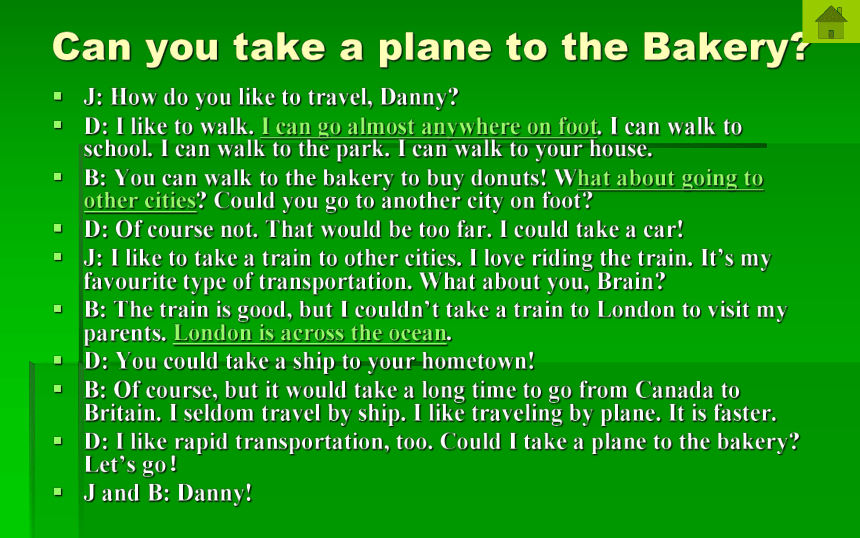冀教版八年级上册Unit 6 Go With Transportation !Lesson 31 How Do You Travel ?课件(共25张PPT)
文档属性
| 名称 | 冀教版八年级上册Unit 6 Go With Transportation !Lesson 31 How Do You Travel ?课件(共25张PPT) |  | |
| 格式 | ppt | ||
| 文件大小 | 3.7MB | ||
| 资源类型 | 教案 | ||
| 版本资源 | 冀教版 | ||
| 科目 | 英语 | ||
| 更新时间 | 2022-06-02 11:20:50 | ||
图片预览









文档简介
(共25张PPT)
Lesson 31
How Do You Travel
new words
text
think about it
单元导入
transportation
ship n. 轮船
.
the Palace Museum
.
the Summer Palace
.
the Great Wall
Think about it
How do you travel around in your city or town
What’s your favourite type of transportation
What type of transportation does Danny like best What about Jenny and Brian
Can you take a plane to the Bakery
J: How do you like to travel, Danny
D: I like to walk. I can go almost anywhere on foot. I can walk to school. I can walk to the park. I can walk to your house.
B: You can walk to the bakery to buy donuts! What about going to other cities Could you go to another city on foot
D: Of course not. That would be too far. I could take a car!
J: I like to take a train to other cities. I love riding the train. It’s my favourite type of transportation. What about you, Brain
B: The train is good, but I couldn’t take a train to London to visit my parents. London is across the ocean.
D: You could take a ship to your hometown!
B: Of course, but it would take a long time to go from Canada to Britain. I seldom travel by ship. I like traveling by plane. It is faster.
D: I like rapid transportation, too. Could I take a plane to the bakery Let’s go!
J and B: Danny!
1.What’s your favourite type of transportation 你最喜欢哪种交通方式?
favourite adj. 最喜欢的
My favourite subject is maths. 我最喜欢的学科是数学。
n. 最喜欢的人或物
Tom is my favourite. 汤姆是我最喜欢的人。
Basketball is my favourite. 篮球是我的最爱。
【拓展】
favourite可以与like…best(最喜欢……)进行同义句转换。如:
My favourite city is Beijing.
=I like Beijing best. 我最喜欢的城市是北京。
2. I can go almost anywhere on foot. 我几乎能步行去任何地方。
1) almost adv. 几乎,差不多
Mum slept almost the whole way. 妈妈几乎一路都在睡觉。
辨析:almost与nearly
almost与nearly都有“几乎,差不多”的意思,一般说来,almost比nearly更能表示接近于实际情况。如:
I’m almost/nearly as tall as you. 我几乎与你一样高。
He spends almost/nearly five pounds on food every day. 他每天差不多花5英镑用于买食品。
但应注意以下区别:
nearly可以被not修饰,almost则不能。not nearly译为“远远不”。如:
There are not nearly(不用almost)enough people to do the work. 做这项工作的人远远不够。
The question is not nearly(不用almost)as easy as you think. 问题远非你想的那样容易。
b. almost之后接never, no, nobody, nothing, no one等; nearly则不能。如:
There was almost (不用nearly) no snow that winter. 那年冬天几乎不下雪。
Almost no one saw her. 几乎没有人看见她。
2) anywhere adv.
a. 任何地方
I’ll meet you anywhere you like. 我愿意在你所喜欢的任何地方碰面。
You may leave your bag anywhere in the room. 你可以把包放在房间的任何地方。
b. 无论何处
We’ll go anywhere the Party direct us. 党指向哪里,我们就跟到哪里。
【衔接】
somewhere的用法
a. adv. 在某处
He lives somewhere in this neighbourhood. 他住在附近某处。
You’ll find the passage somewhere in the book. 你可以在这本书某个地方找到这篇文章。
b. adv. 到某处
Go somewhere out of town. 到城外某地去。
【注意】
somewhere只能用于肯定句中;而anywhere可用于否定句或一般疑问句中。如:
I can’t find my book. Have you seen it anywhere 我找不到我的书了,你在哪儿见过吗?
3) on foot步行,在句中常作状语,修饰前面的动词,表示步行去(到)某地。如:
3. I went to the park on foot yesterday. 昨天我步行去了公园。(on foot修饰动词went)
He gets to school on foot every day. 他每天步行到学校。(on foot修饰动词短语get to)
【注意】
go to…on foot相当于walk to… 如:
Those students go to the farm on foot every Sunday.
=Those students walk to the farm every Sunday. 那些学生每个星期天都步行去农场。
【拓展】
使用交通工具的表达方式:
a. 动词表达法。如:walk(步行),ride(骑),take(乘)等。如:
I ride my bike to school every day. 我每天骑自行车上学。
He is going to take a bus to the city. 他要乘公共汽车去城里。
b. by+交通工具(交通工具前不加任何限定词)如:
I go to school by bike every day. 我每天骑自行车上学。
【注意】在这里by意为“骑……”,“乘……”。
c. 介词表达法。用介词in/on+a/an+交通工具。除冠词外,交通工具前也可以用物主代词来修饰。如:
He goes to school by bike every day. 他每天骑他的自行车上学。
4. What about going to other cities 但是去其他城市呢?
other在句中译为“别的,其他的”。
1) adj.“别的,其他的”。作定语,后面可以接单数名词、复数名词和不可数名词,前面可以用some, any等词修饰。
Do you have any other book on history 你还有其他有关历史方面的书吗?
There are some other ways of doing this exercise. 这个练习还有其他的一些做法。
2) pron. “别的,其他的”,复数形式是others。
I don’t like these. Can you show me any others 我不喜欢这些,你是否另外再拿些给我看看?
She thinks only of others’ good. 她只想到别人的好处。
辨析:others, the other, the others与another
1)others前不加the,泛指“别的东西,别人,他人”。
It is not difficult to do good to others. 为别人做点好事不难。
2) the other表示特指两者中的“另一个”。
I have two pens. One is red, the other is black. 我有两支钢笔。一支是红色的,另一支是黑色的。
3) the others特指在一个物体中“其余的人或物”。
We got to the park by 6 o’clock, but the others of our class didn’t arrive until 8 o’clock. 我们是6点到公园的,但我班的其他人直到8点才到。
(the others指除了我们以外的所有其他同学)
4)another另一个,表示三者以上不定数目中的“另一个”。
I have eaten only one hamburger. I would like another one. 我只吃了一个汉堡包。我还要吃一个。
Have another cup of tea, please. 请再喝一杯茶。
【拓展】
else同other,也是“别的”,“其他的”的意思,但else通常放于不定代词someone, anyone, anybody, nobody和疑问词what, who, when, where之后。如:
She is taller than anyone else in the class. 在班里她比任何人都高。
5.London is across the ocean. 伦敦在海洋的一边。
a. across prep.“在……另一边。如:
The bus stop is across the road. 公共汽车站在马路对面。
b. (从一边到另一边)横过,越过
He came across the road. 他横过马路过来。
c. across from在……对过(面)。如:
The post office is across from the street. 邮局在街道对面。
d. cross vt. 穿过=go/walk across。如:
Cross the street and turn right. You’ll find it. 穿过街道,向右拐,你会找到的。
辨析:across与through
across表示从物体的表面横穿过去。如:
There is a bridge across the river. 有一座桥横跨这条河。
through指从物体的内部穿过。如:
She drove straight through the town. 她驱车直穿这个城镇。
6. I like rapid transportation, too. 我喜欢快速的交通运输方式。
rapid adj. 快的,迅速的,动作快的。如:a rapid current急流 a rapid march急行军
辨析:rapid, fast与quickly
rapid是形容词,在句中常作定语;fast作副词,常指动作本身的迅速;quickly表示即刻行动,毫不迟延,指动作在较短的时间或较近的将来即可发生或完成。
试比较:
Tom is a rapid worker. 汤姆是个做事麻利的工人。
He speaks very fast. 他说话很快。
Come here quickly. The meeting will begin in a minute. 快点儿来,会议马上开始了。
Jack is making rapid progress in maths. 杰克在数学方面进步相当快。
Don’t run so fast, Mike. 迈克,不要跑的那么快。
He quickly picked the wallet on the ground. 他很快地拾起地上的钱夹。
一、根据句意及汉语提示写出单词:
1.Beijing is my _________(家乡)。 I love it very much.
2.Tina is very quiet. She ______(很少) plays football。
3.Plane are more _________(快速的) than buses.
4.What’s your favourite type of _____________(交通工具).
hometown
seldom
rapid
transportation
用所给词的正确形式填空:
visit travel foot go take
We go to school on ________.
I take a train ________my parents every month.
How about ______shopping with me
It ________me two hours to finish the work yesterday.
5. How do you like _____________
foot
to visit
going
took
to travel
根据汉语提示完成句子:
1.我姐姐步行去工作:
My sisiter goes to work ________ __________.
My sister ____________to work.
2.你将乘火车去旅行吗?
Will you _______ ________ _________ to travel
Will you travel _________ ___________
3.当你年轻时你可以去你想去的任何地方。
You can _______ _________ you want when you are young.
4.今晚去看场电影怎么样?
________ _________ __________ a movie tonight
on foot
walks
take a train
go anywhere
What about seeing
by train
Lesson 31
How Do You Travel
new words
text
think about it
单元导入
transportation
ship n. 轮船
.
the Palace Museum
.
the Summer Palace
.
the Great Wall
Think about it
How do you travel around in your city or town
What’s your favourite type of transportation
What type of transportation does Danny like best What about Jenny and Brian
Can you take a plane to the Bakery
J: How do you like to travel, Danny
D: I like to walk. I can go almost anywhere on foot. I can walk to school. I can walk to the park. I can walk to your house.
B: You can walk to the bakery to buy donuts! What about going to other cities Could you go to another city on foot
D: Of course not. That would be too far. I could take a car!
J: I like to take a train to other cities. I love riding the train. It’s my favourite type of transportation. What about you, Brain
B: The train is good, but I couldn’t take a train to London to visit my parents. London is across the ocean.
D: You could take a ship to your hometown!
B: Of course, but it would take a long time to go from Canada to Britain. I seldom travel by ship. I like traveling by plane. It is faster.
D: I like rapid transportation, too. Could I take a plane to the bakery Let’s go!
J and B: Danny!
1.What’s your favourite type of transportation 你最喜欢哪种交通方式?
favourite adj. 最喜欢的
My favourite subject is maths. 我最喜欢的学科是数学。
n. 最喜欢的人或物
Tom is my favourite. 汤姆是我最喜欢的人。
Basketball is my favourite. 篮球是我的最爱。
【拓展】
favourite可以与like…best(最喜欢……)进行同义句转换。如:
My favourite city is Beijing.
=I like Beijing best. 我最喜欢的城市是北京。
2. I can go almost anywhere on foot. 我几乎能步行去任何地方。
1) almost adv. 几乎,差不多
Mum slept almost the whole way. 妈妈几乎一路都在睡觉。
辨析:almost与nearly
almost与nearly都有“几乎,差不多”的意思,一般说来,almost比nearly更能表示接近于实际情况。如:
I’m almost/nearly as tall as you. 我几乎与你一样高。
He spends almost/nearly five pounds on food every day. 他每天差不多花5英镑用于买食品。
但应注意以下区别:
nearly可以被not修饰,almost则不能。not nearly译为“远远不”。如:
There are not nearly(不用almost)enough people to do the work. 做这项工作的人远远不够。
The question is not nearly(不用almost)as easy as you think. 问题远非你想的那样容易。
b. almost之后接never, no, nobody, nothing, no one等; nearly则不能。如:
There was almost (不用nearly) no snow that winter. 那年冬天几乎不下雪。
Almost no one saw her. 几乎没有人看见她。
2) anywhere adv.
a. 任何地方
I’ll meet you anywhere you like. 我愿意在你所喜欢的任何地方碰面。
You may leave your bag anywhere in the room. 你可以把包放在房间的任何地方。
b. 无论何处
We’ll go anywhere the Party direct us. 党指向哪里,我们就跟到哪里。
【衔接】
somewhere的用法
a. adv. 在某处
He lives somewhere in this neighbourhood. 他住在附近某处。
You’ll find the passage somewhere in the book. 你可以在这本书某个地方找到这篇文章。
b. adv. 到某处
Go somewhere out of town. 到城外某地去。
【注意】
somewhere只能用于肯定句中;而anywhere可用于否定句或一般疑问句中。如:
I can’t find my book. Have you seen it anywhere 我找不到我的书了,你在哪儿见过吗?
3) on foot步行,在句中常作状语,修饰前面的动词,表示步行去(到)某地。如:
3. I went to the park on foot yesterday. 昨天我步行去了公园。(on foot修饰动词went)
He gets to school on foot every day. 他每天步行到学校。(on foot修饰动词短语get to)
【注意】
go to…on foot相当于walk to… 如:
Those students go to the farm on foot every Sunday.
=Those students walk to the farm every Sunday. 那些学生每个星期天都步行去农场。
【拓展】
使用交通工具的表达方式:
a. 动词表达法。如:walk(步行),ride(骑),take(乘)等。如:
I ride my bike to school every day. 我每天骑自行车上学。
He is going to take a bus to the city. 他要乘公共汽车去城里。
b. by+交通工具(交通工具前不加任何限定词)如:
I go to school by bike every day. 我每天骑自行车上学。
【注意】在这里by意为“骑……”,“乘……”。
c. 介词表达法。用介词in/on+a/an+交通工具。除冠词外,交通工具前也可以用物主代词来修饰。如:
He goes to school by bike every day. 他每天骑他的自行车上学。
4. What about going to other cities 但是去其他城市呢?
other在句中译为“别的,其他的”。
1) adj.“别的,其他的”。作定语,后面可以接单数名词、复数名词和不可数名词,前面可以用some, any等词修饰。
Do you have any other book on history 你还有其他有关历史方面的书吗?
There are some other ways of doing this exercise. 这个练习还有其他的一些做法。
2) pron. “别的,其他的”,复数形式是others。
I don’t like these. Can you show me any others 我不喜欢这些,你是否另外再拿些给我看看?
She thinks only of others’ good. 她只想到别人的好处。
辨析:others, the other, the others与another
1)others前不加the,泛指“别的东西,别人,他人”。
It is not difficult to do good to others. 为别人做点好事不难。
2) the other表示特指两者中的“另一个”。
I have two pens. One is red, the other is black. 我有两支钢笔。一支是红色的,另一支是黑色的。
3) the others特指在一个物体中“其余的人或物”。
We got to the park by 6 o’clock, but the others of our class didn’t arrive until 8 o’clock. 我们是6点到公园的,但我班的其他人直到8点才到。
(the others指除了我们以外的所有其他同学)
4)another另一个,表示三者以上不定数目中的“另一个”。
I have eaten only one hamburger. I would like another one. 我只吃了一个汉堡包。我还要吃一个。
Have another cup of tea, please. 请再喝一杯茶。
【拓展】
else同other,也是“别的”,“其他的”的意思,但else通常放于不定代词someone, anyone, anybody, nobody和疑问词what, who, when, where之后。如:
She is taller than anyone else in the class. 在班里她比任何人都高。
5.London is across the ocean. 伦敦在海洋的一边。
a. across prep.“在……另一边。如:
The bus stop is across the road. 公共汽车站在马路对面。
b. (从一边到另一边)横过,越过
He came across the road. 他横过马路过来。
c. across from在……对过(面)。如:
The post office is across from the street. 邮局在街道对面。
d. cross vt. 穿过=go/walk across。如:
Cross the street and turn right. You’ll find it. 穿过街道,向右拐,你会找到的。
辨析:across与through
across表示从物体的表面横穿过去。如:
There is a bridge across the river. 有一座桥横跨这条河。
through指从物体的内部穿过。如:
She drove straight through the town. 她驱车直穿这个城镇。
6. I like rapid transportation, too. 我喜欢快速的交通运输方式。
rapid adj. 快的,迅速的,动作快的。如:a rapid current急流 a rapid march急行军
辨析:rapid, fast与quickly
rapid是形容词,在句中常作定语;fast作副词,常指动作本身的迅速;quickly表示即刻行动,毫不迟延,指动作在较短的时间或较近的将来即可发生或完成。
试比较:
Tom is a rapid worker. 汤姆是个做事麻利的工人。
He speaks very fast. 他说话很快。
Come here quickly. The meeting will begin in a minute. 快点儿来,会议马上开始了。
Jack is making rapid progress in maths. 杰克在数学方面进步相当快。
Don’t run so fast, Mike. 迈克,不要跑的那么快。
He quickly picked the wallet on the ground. 他很快地拾起地上的钱夹。
一、根据句意及汉语提示写出单词:
1.Beijing is my _________(家乡)。 I love it very much.
2.Tina is very quiet. She ______(很少) plays football。
3.Plane are more _________(快速的) than buses.
4.What’s your favourite type of _____________(交通工具).
hometown
seldom
rapid
transportation
用所给词的正确形式填空:
visit travel foot go take
We go to school on ________.
I take a train ________my parents every month.
How about ______shopping with me
It ________me two hours to finish the work yesterday.
5. How do you like _____________
foot
to visit
going
took
to travel
根据汉语提示完成句子:
1.我姐姐步行去工作:
My sisiter goes to work ________ __________.
My sister ____________to work.
2.你将乘火车去旅行吗?
Will you _______ ________ _________ to travel
Will you travel _________ ___________
3.当你年轻时你可以去你想去的任何地方。
You can _______ _________ you want when you are young.
4.今晚去看场电影怎么样?
________ _________ __________ a movie tonight
on foot
walks
take a train
go anywhere
What about seeing
by train
同课章节目录
- Unit 1 Me and My Class
- Lesson 1 Back to School!
- Lesson 2 Many Faces, One Picture
- Lesson 3 Getting to Know You!
- Lesson 4 Best Friends
- Lesson 5 Meet Ms. Liu
- Lesson 6 Jenny's Week
- Unit 2 My Favourite School Subject
- Lesson 7 Don't Be Late for Class!
- Lesson 8 E-mail Helpers!
- Lesson 9 I Don't Want to Miss Geography !
- Lesson 10 Looking for Lisa
- Lesson 11 Lily Learns about China !
- Lesson 12 Karen's Hair Stood Up!
- Unit Review
- Unit 3 Families Celebrate Togethe
- Lesson 13 I Love Autumn
- Lesson 14 Happy Memories
- Lesson 15 A Present for Li Ming!
- Lesson 16 Happy Thanksgiving!
- Lesson 17 Presents from Canada!
- Lesson 18 Li Ming's Birthday
- Unit Review
- Unit 4 My Neighbourhood
- Lesson 19 The Best Neighourhood
- Lesson 20 No Stopping!
- Lesson 21 Eat a Donut and Turn Right
- Lesson 22 I Like My Neighbourhood
- Lesson 23 People in My Neighbourhood
- Lesson 24 I Need a Map!
- Unit Review
- Unit 5 My Future
- Lesson 25 I Want to Be a Teacher!
- Lesson 26 What Will I Be ?
- Lesson 27 What's Your Advice?
- Lesson 28 Rich or Poor? It Doesn't Matter!
- Lesson 29 Our Ambitions and Dreams
- Lesson 30 A Famous Friend?
- Unit Review
- Unit 6 Go With Transportation !
- Lesson 31 How Do You Travel ?
- Lesson 32 Trains Go Faster !
- Lesson 33 Life on Wheels
- Lesson 34 Flying Donuts
- Lesson 35 Future Transportation
- Lesson 36 Clean Cars ?
- Unit Review
- Unit 7 Enjoy Your Hobby
- Lesson 37 What's Your Hobby ?
- Lesson 38 Hobbies Are Fun!
- Lesson 39 Danny's Hobby
- Lesson 40 What's Paul's Hobby?
- Lesson 41 Show and Tell!
- Lesson 42 The New Club
- Unit Review
- Unit 8 Celebrating Me
- Lesson 43 What Makes You Unique?
- Lesson 44 Georgia Plays Basketball
- Lesson 45 Be Yourself !
- Lesson 46 My Dream
- Lesson 47 I Made It !
- Lesson 48 Li Ming's Report
- Unit Review
